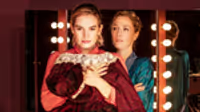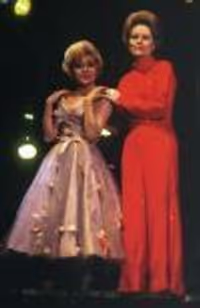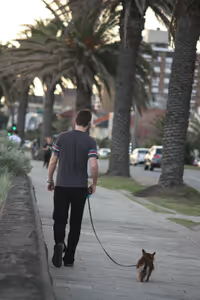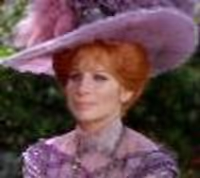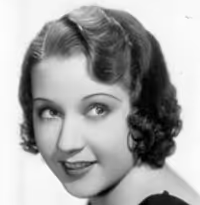Mame lyrics change??
#1Mame lyrics change??
Posted: 4/30/21 at 4:41pm
Greetings! Hope everyone is safe and doing well!
Ive been on a Mame kick lately and wanted to know if Mame were to be revived (and hopefully soon!) would they rework the title song’s lyrics to reflect our current social climate? If my memory serves me correctly, before Mr. Hermans passing, didnt he express a possible revamp of his score and understanding that certain lyrics may appear out of date?
Also, while we are on the topic, do you think Mame would be a title to help usher a Broadway comeback as we move closer to reopening. Id love to hear your thoughts!
#2Mame lyrics change??
Posted: 4/30/21 at 5:08pm
I’m a big fan of MAME, and some of it is for nostalgic reasons, but mostly I love what the character stands for and the glamour and joy of the show itself. I’d welcome a revival with the right cast, and the right Mame. It’s a difficult role to cast, especially for a big commercial Broadway production.
The title song was meant to be a spoof of songs like “Rockabye Your Baby”, and indeed such songs are... antiquated to say the least. I think as long as it scans and rhymes, changing the “Dixie back to Dixeland” line, would be fine. And Mother Burnside’s line, too— mustn’t forget that. Remember that Mame trounces their traditions and “decorum”, wins them over with her liberal inclusivity, and gets Beau away from the cartoonish, yet still vile Sally Cato and Mother Burnside. That’s always been my take. I’m sure other modifications can be made to that scene, and I’d welcome them.
Ito’s offensive accent— prevalent in the non-musical AUNTIE MAME— is non-existent in the musical. She treats him, and everyone she cares for, with dignity and affection. Mame Dennis is about respecting people for who they are, not WHAT they are (i.e. Mr. Babcock and the Upsons).
I know people aren’t in favor of keeping MAME in the public consciousness, but I think it’s above all a glamorous fantasy, and that its leading lady promotes inclusivity and respect. But that’s just my opinion.
#3Mame lyrics change??
Posted: 4/30/21 at 5:35pm
Right on, Jv92! Thank you for sharing your insight.
Mame represents a lot for me to- as you mentioned - she’s totally “unconventional “ and is a free thinker. Open A New Window is such a beautiful anthem to represent that spirit.
I think with a little dusting, Mame could make another dazzling debut down that staircase- and agreed- with the right casting and compassion!
#4Mame lyrics change??
Posted: 4/30/21 at 7:09pm
I doubt if anyone would touch it right now unless the whole southern plantation thing and the Asian servant role were excised.
#5Mame lyrics change??
Posted: 4/30/21 at 7:09pm
Jerry Herman said many times that he thought Catherine Zeta-Jones would make a wonderful Mame. He was right. She would be great.
#6Mame lyrics change??
Posted: 4/30/21 at 7:15pm
Impeach2017- no doubt there needs to be heavy consideration on the book of the show. It definitely needs some TLC.
Nealb1- CZJ was a name that came into my mind- Vanessa Williams as Vera?
#7Mame lyrics change??
Posted: 4/30/21 at 7:22pm
We live in a world where Mame (of all things!) is triggering. Lord...
#8Mame lyrics change??
Posted: 4/30/21 at 7:27pm
Nealb1- CZJ was a name that came into my mind- Vanessa Williams as Vera?
Vanessa would respond to any offer to play Vera in MAME with one long note. Let’s just say, no one will acknowledge receiving that note. It would make your hair stand on end. Hahaha.
Ravenclaw
Leading Actor Joined: 9/16/17
#10Mame lyrics change??
Posted: 4/30/21 at 8:25pm
I agree with everything jv92 said. The spirit of Mame is exactly the spirit we need as we reemerge from the pandemic, and if only a couple cosmetic changes will be needed for new audiences to embrace the piece, then why not change them? The story is about inclusivity, love, acceptance, found family, and making the most of your circumstances. If Auntie Mame herself were able to weigh in on the matter, I'm sure she would be completely fine with a rewrite of her title anthem if it meant bringing more joy to more people.
#11Mame lyrics change??
Posted: 4/30/21 at 9:05pm
Ah, Mame.
In 1968, I was a young sailor stationed onboard a U.S. Navy ship in Scotland. One weekend, my shipmate/partner and I flew down to London to see Ginger Rogers starring as "Mame". One of the best theatrical evenings of our lives (and we now have been together more than half a century). Ginger was remarkable. She probably was around 57 years old, and I still remember how toned her legs were. We kept the programs from that performance. Some many years later, shortly before Ginger passed away, we attended a book signing of her autobiography. She kindly signed our "Mame" programs.
#12Mame lyrics change??
Posted: 4/30/21 at 9:59pm
Parade has "Old Red Hills of Home". Cabaret has "Tomorrow Belongs to Me"
"Everything's Coming Up Roses" is supposed to be a scary number and staged in contrast to the lyrics.
The Mame title song need not be staged as a rip-roaring ode to the Old South. The "Mame" title song can be staged so that Mame constantly shows disgust/shock on her face at what the people are singing to her. (I'd excise the dance break). I don't know the dialog that follows the song but it could be revised, if necessary, for Mame's attitude to be communicated.
#13Mame lyrics change??
Posted: 4/30/21 at 10:19pm
Eve Harrington3 said: "BrodyFosse123- Johnny one note?? Uh oh lol ?"
More like “one trick pony”, y’all.
Dollypop
Broadway Legend Joined: 5/15/03
#14Mame lyrics change??
Posted: 4/30/21 at 11:08pm
Highland Guy said: "Ah, Mame.
In 1968, I was a young sailor stationed onboard a U.S. Navy ship in Scotland. One weekend, my shipmate/partner and I flew down to London to see Ginger Rogers starring as "Mame". One of the best theatrical evenings of our lives (and we now have been together more than half a century). Ginger was remarkable. She probably was around 57 years old, and I still remember how toned her legs were. We kept the programs from that performance. Some many years later, shortly before Ginger passed away, we attended a book signing of her autobiography. She kindly signed our "Mame" programs.
Sadly, that video clip shows a distorted view of the title number. In the original staging, Angela Lansbury had her back to the audience for a good portion of it. Obviously that isn't the case here.
Was the change done just for television or did the London production re-stage the number for Miss Rogers?
"
#15Mame lyrics change??
Posted: 4/30/21 at 11:11pm
ggersten said: "Parade has "Old Red Hills of Home". Cabaret has "Tomorrow Belongs to Me"
"Everything's Coming Up Roses" is supposed to be a scary number and staged in contrast to the lyrics.
The Mame title song need not be staged as a rip-roaring ode to the Old South. The "Mame" title song can be staged so that Mame constantly showsdisgust/shockon her face at what the people are singing to her. (I'd excise the dance break). I don't know the dialog that follows the song but it could be revised, if necessary, for Mame's attitude to be communicated."
The point is, it was never that. Saying the song "Mame" is a rip-roaring ode to the Old South is like saying the song "Hello, Dolly" demonstrates customer service workers don't want decent pay, workable hours or to avoid overwhelming duties, they just want an old lady to fawn over (and who will never tip them). These are not realistic shows.
NO, absolutely not should Mame "show disgust/shock" in response to their lyrics. It would be rude on her part in the moment (her entire goal has been to charm these people--and now she has), and it would ruin the whole point of that moment and the song--this is the number, just like with "Hello, Dolly" where the adulation of the crowd specifically signals to the man the woman wants to attract how appealing everyone finds her. You think Beau would marry her if she showed shock and disgust towards his family's traditions? You just have to accept the show is what it is.
But, geez, this isn't The Birth of a Nation. It's a silly show in an alternate reality with cartoon characters. Mame is a lot of things. It's camp. It's escapism. It's sentimental. It is not a treatise on race relations nor an endorsement of Lost Cause sentiment.
I can't believe this is a discussion. It take it back; I can.
#16Mame lyrics change??
Posted: 5/1/21 at 11:02am
jv92 said: "I’m a big fan of MAME, and some of it is for nostalgic reasons, but mostly I love what the character stands for and the glamour and joy of the show itself. I’d welcome a revival with the right cast, and the right Mame. It’s a difficult role to cast, especially for a big commercial Broadway production.
The title song was meant to be a spoof of songs like “Rockabye Your Baby”, and indeed such songs are... antiquated to say the least. I think as long as it scans and rhymes, changing the “Dixie back to Dixeland” line, would be fine. And Mother Burnside’s line, too— mustn’t forget that.Remember that Mame trounces their traditions and “decorum”, wins them over with her liberal inclusivity, and gets Beau away from the cartoonish, yet still vile Sally Cato and Mother Burnside. That’s always been my take. I’m sure other modifications can be made to that scene, and I’d welcome them.
Ito’s offensive accent— prevalent in the non-musical AUNTIE MAME— is non-existent in the musical. She treats him, and everyone she cares for, with dignity and affection. Mame Dennis is about respecting people for who they are, not WHAT they are (i.e. Mr. Babcock and the Upsons).
I know people aren’t in favor of keeping MAME in the public consciousness, but I think it’s above all a glamorous fantasy, and that its leading ladypromotes inclusivity and respect. But that’s just my opinion."
JV, you've got your finger on something, If the book could slightly beef up Mame's political aversion to the Burnsides vis a vis white supremacism in the way the book already does for Mame's political averion to the Upsons vis a vis antisemitism, it might just work.
What's odd in Mame is that Mame rejects the values of the Upsons and rescues Patrick from their clutches but she gets her feet and libido swept up in Old Southern aristocracy... of all things.. This goes unexamined in the play and musical... the sad thing is that the inconsistency went unnoticed in the 50s and 60s... any revival of Mame would have to resolve that in some way... with a taste and wit that compliments Mame's polite distaste for the Upsons.. Beau's humanity in contrast to Gloria's would have to be clearer politically.
Cue some who may say I'm getting ridiculously "woke" about a feel good musical.
My response: Mame is a feel good musical but a political one as well, built on a woman who in large part lives to defy stale convention and prejudice.
#17Mame lyrics change??
Posted: 5/1/21 at 2:56pm
I don't think any explanation is needed, as I don't think the antisemitism angle is played up in the musical as it is in the book and the stage play/movie, so there's no great discrepancy. Indeed, Mame's big revenge on the Upsons isn't locating a home for Jewish refugee children next door to them (and yes, you can unpack the politics of that, if you need more to be woke over--placing those poor kids who have been through so much amidst violently hostile neighbors, just so Mame can score a bitchy victory). Instead, she plans to open a home for unwed mothers.
It may be worth pointing out what actually happens in the earlier versions. The Upsons are vocal bigots and, in the novel not only does Mr. Upson join his family in not wanting Jews in their suburb but agrees with Hitler about the Final Solution. In contrast, not one Southerner in the book ever expresses any racial views or anything but the most benign cliches about Northerners vs. Southerners or respect for Confederate generals; thus, there's nothing for Mame to be offended by or react against.
And of course, Mame loves fantasy. She redecorates her home to fit whatever fantasy she wants. She's spent some time in the novel prior to Patrick meeting her playing at being Spanish, and when he first meets her, she's playing at being Chinese. Playing Southern belle for a time is just one more costume, one more momentary diversion for her. Late in the novel and book, she'll play at being Indian. She doesn't take any of it, or much of life, that seriously. It's a series of costumes to adopt for a time, to enjoy and discard. That's what's fun and eccentric about her.
Once again, this is fantasy. There are plenty of people who have supported liberal causes and insisted on the equality of the races who have loved the story of Auntie Mame in all its forms. Because they realized the difference between fiction and reality and between imaginary worlds and social realities. Yes, it was unusual and terrific for a comedy that Mame stands up to anti-semitism. But that she hadn't earlier in the evening (or book) stood up to (a never demonstrated) racism didn't matter to the audience because they knew they were watching/reading a lightweight comedy and didn't expect it. No one was looking for consistency or "truth" about important social issues in the character of Mame Dennis. That isn't what she existed for.
The inability of Millennials, and possibly (but I'm not at all sure) members of Gen Z, to grasp this, and somehow feel, not only offended, but threatened by a piece of lightweight entertainment, is just a storm we'll have to weather online until saner minds prevail again.
I doubt Mame is going anywhere. I knew it from my childhood, and by the time I was an adult had started to think of it as an old chestnut, but decade after decade I've seen the musical staged to acclaim across the country. I was surprised in my mid-30's and 40's to keep finding gay men just discovering and falling in love with the novel and the movie. It seems to be evergreen. If it isn't going to be staged right now, I suspect that has less to do with how the general public would respond to it than with producers fretting over some loud voices on the internet at this moment.
#18Mame lyrics change??
Posted: 5/1/21 at 3:28pm
Frankly, that whole gay men idolizing and pretending to be the valiant woman fantasy thing has become rather stale and outdated. As for the loud voices, you could turn down the volume if they offend you.
#19Mame lyrics change??
Posted: 5/1/21 at 5:38pm
Homophobic and clueless at once. I don't know of any men pretending to be women because they enjoy the character of Auntie Mame.
I can ignore a conversation, but you could equally advise the people offended by Mame to just not attend a performance or pay attention to the cast album.
#20Mame lyrics change??
Posted: 5/1/21 at 5:40pm
Back in high school, we would whisper sing backstage:
“You s*uck my d*ck like it was a horn, Mame,
You stay home Friday night and watch porn, Mame!”
Obviously those lyrics need to be changed because you can’t suck a horn.
#21Mame lyrics change??
Posted: 5/1/21 at 6:13pm
I played Young Patrick when I was 11 in 1986, and for the rest of her life nothing I ever did impressed my Grandmother more than that. She came to a number of my shows in college and early in my career and inevitably she'd say "You know, I still remember when you were in 'Mame""...
She hung around for 96 years, ultimately, and 95 of them were amazingly robust but the last year was pretty rough and by the end she was barely hearing and mostly confined to a chair/bed. The last time I saw her I played piano for her, even though I figured it was a little moot since she could hardly hear. But I played "Mame" and something about that melody made it all the way through the fog and sickness and she could suddenly hear perfectly clearly. Something about Jerry's music is just so primal and plucked-from-the-universe in its catchiness that I truly believe it has magical powers. I finished playing and she said, "You know, I still remember when you were in 'Mame'...."
I reread the libretto for the first time in a while not too long ago and was struck by how sort of disjointed and episodic it really was. The characters and the ideas are so great - I truly think it was the catalyst that made me a liberal and I think playing that role when I did had a profound effect on my ideology, but it's not a brilliant construction in the way "Dolly" is. But I suspect somebody out there could redirect the lyrics in the title song just enough, sort of like how Sheldon Harnick rewrote that verse of "I Love A Cop" since the verse about getting beaten is so at odds with what the song is meaning to do. Similarly, I think it could be tweaked enough to make seem like the goofy celebratory joy it's meant to be without the unfortunate implications. I love the show but think it could benefit more than most from that era with a little tinkering from the right hands.
And obviously Mame cannot react to that song in disgust, but I wonder if there's a moment to be had when Mother Burnside yells "This time the South will rise again!" - I could see maybe not singing the "Maaa-aame" that follows and making that a record scratch "Wha?" moment. I don't know, it's a show I'd be genuinely excited to get a non-Scott Rudin Scott Rudin revival of.
#22Mame lyrics change??
Posted: 5/1/21 at 6:58pm
I think the record scratch idea is a clever solution, actually. But if the South did rise again due to Mame, it would be a South that embraced people of all races, so the lyric as stands doesn't bother me, whatever Mother Burnside herself means by it.
I agree about the disjointedness. I don't think there's a way around it, though. The show is episodic by nature.
#23Mame lyrics change??
Posted: 5/2/21 at 9:00am
joevitus point well taken.
But do you think a largely unexamined (albeit sprinkled with a blithely irony, at least for a discerning audience) rhapsodization of the Old South set smack in the middle of Jim Crow would be easily accepted today as the first act curtain of a musical comedy?
KFC1991
Stand-by Joined: 7/10/18
#24Mame lyrics change??
Posted: 5/2/21 at 11:32am
I'm surprised whenever someone says the Mame title song is problematic. Only one line ("this time the South will rise again") might be iffy but that could be changed. Most of the lines aren't remotely offensive: "were baking pecan pies again" "your skin is Dixie satin".
As far as the Jim crow Southern culture going unexamined, well let's not forget there was racism in the north and the musical doesn't explore that either, despite being anti-bigotry.
But just because this is a musical comedy doesn't mean it's not political or that it's ridiculous to discuss the politics of the piece. Mame is broadly speaking a very progressive work, as is Dolly in its way, and La Cage too.
Jarethan
Broadway Legend Joined: 2/10/11
#25Mame lyrics change??
Posted: 5/2/21 at 5:32pm
I do not actually remember if Ito was written as a stereotype. I think that would be easy to address if it was. RE the title song, I have two reactions...the song is intentionally making fun of the South's attitudes. I dont think they have to change it. That said, I imagine it would also be pretty easy to address by adding some more comedy leading into the song, essentially making fun of the people in a benign way.
Videos


